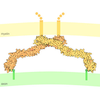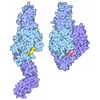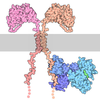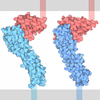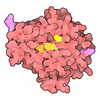[English] 日本語
 Yorodumi
Yorodumi- PDB-8vrw: Cryo-EM structure of human invariant chain in complex with HLA-DR15 -
+ Open data
Open data
- Basic information
Basic information
| Entry | Database: PDB / ID: 8vrw | ||||||
|---|---|---|---|---|---|---|---|
| Title | Cryo-EM structure of human invariant chain in complex with HLA-DR15 | ||||||
 Components Components |
| ||||||
 Keywords Keywords | IMMUNE SYSTEM / Antigen presentation / membrane protein / trimeric complex | ||||||
| Function / homology |  Function and homology information Function and homology informationnegative regulation of peptide secretion / macrophage migration inhibitory factor signaling pathway / NOS2-CD74 complex / MHC class II protein binding, via antigen binding groove / antigen processing and presentation of endogenous antigen / positive regulation of dendritic cell antigen processing and presentation / negative regulation of T cell differentiation / macrophage migration inhibitory factor binding / positive regulation of macrophage migration inhibitory factor signaling pathway / protein trimerization ...negative regulation of peptide secretion / macrophage migration inhibitory factor signaling pathway / NOS2-CD74 complex / MHC class II protein binding, via antigen binding groove / antigen processing and presentation of endogenous antigen / positive regulation of dendritic cell antigen processing and presentation / negative regulation of T cell differentiation / macrophage migration inhibitory factor binding / positive regulation of macrophage migration inhibitory factor signaling pathway / protein trimerization / macrophage migration inhibitory factor receptor complex / regulation of interleukin-4 production / positive regulation of cytokine-mediated signaling pathway / regulation of interleukin-10 production / myeloid dendritic cell antigen processing and presentation / antigen processing and presentation of endogenous peptide antigen via MHC class II / autolysosome membrane / regulation of T-helper cell differentiation / positive regulation of prostaglandin biosynthetic process / T cell activation involved in immune response / T cell selection / positive regulation of type 2 immune response / positive regulation of CD4-positive, CD25-positive, alpha-beta regulatory T cell differentiation / MHC class II receptor activity / host-mediated suppression of symbiont invasion / positive regulation of CD4-positive, alpha-beta T cell activation / MHC class II protein binding / negative thymic T cell selection / antigen processing and presentation of peptide or polysaccharide antigen via MHC class II / negative regulation of mature B cell apoptotic process / positive regulation of kinase activity / positive regulation of memory T cell differentiation / positive regulation of T cell mediated immune response to tumor cell / positive regulation of monocyte differentiation / inflammatory response to antigenic stimulus / positive thymic T cell selection / CD4 receptor binding / vacuole / cytokine receptor activity / positive regulation of chemokine (C-X-C motif) ligand 2 production / intermediate filament / prostaglandin biosynthetic process / positive regulation of neutrophil chemotaxis / T-helper 1 type immune response / positive regulation of T cell differentiation / positive regulation of macrophage cytokine production / negative regulation of intrinsic apoptotic signaling pathway in response to DNA damage by p53 class mediator / transport vesicle membrane / cytokine binding / antigen processing and presentation / regulation of macrophage activation / Translocation of ZAP-70 to Immunological synapse / Phosphorylation of CD3 and TCR zeta chains / nitric-oxide synthase binding / negative regulation of DNA damage response, signal transduction by p53 class mediator / polysaccharide binding / : / negative regulation of type II interferon production / immunoglobulin mediated immune response / humoral immune response / macrophage differentiation / Generation of second messenger molecules / immunological synapse / Co-inhibition by PD-1 / epidermis development / response to type II interferon / positive regulation of insulin secretion involved in cellular response to glucose stimulus / detection of bacterium / T cell receptor binding / positive regulation of chemokine production / negative regulation of T cell proliferation / positive regulation of B cell proliferation / multivesicular body / protein folding chaperone / MHC class II antigen presentation / lysosomal lumen / negative regulation of cell migration / trans-Golgi network membrane / Cell surface interactions at the vascular wall / positive regulation of interleukin-8 production / protein tetramerization / intracellular protein transport / peptide antigen assembly with MHC class II protein complex / lumenal side of endoplasmic reticulum membrane / negative regulation of inflammatory response to antigenic stimulus / MHC class II protein complex / clathrin-coated endocytic vesicle membrane / ER to Golgi transport vesicle membrane / antigen processing and presentation of exogenous peptide antigen via MHC class II / positive regulation of immune response / peptide antigen binding / positive regulation of T cell activation / structural constituent of cytoskeleton / positive regulation of T cell mediated cytotoxicity / positive regulation of interleukin-6 production / cognition / positive regulation of fibroblast proliferation / Interferon gamma signaling / positive regulation of protein phosphorylation / MHC class II protein complex binding Similarity search - Function | ||||||
| Biological species |  Homo sapiens (human) Homo sapiens (human) | ||||||
| Method | ELECTRON MICROSCOPY / single particle reconstruction / cryo EM / Resolution: 3.03 Å | ||||||
 Authors Authors | Wang, N. / Caveney, N.A. / Jude, K.M. / Garcia, K.C. | ||||||
| Funding support |  United States, 1items United States, 1items
| ||||||
 Citation Citation |  Journal: Proc Natl Acad Sci U S A / Year: 2024 Journal: Proc Natl Acad Sci U S A / Year: 2024Title: Structural insights into human MHC-II association with invariant chain. Authors: Nan Wang / Deepa Waghray / Nathanael A Caveney / Kevin M Jude / K Christopher Garcia /  Abstract: The loading of processed peptides on to major histocompatibility complex II (MHC-II) molecules for recognition by T cells is vital to cell-mediated adaptive immunity. As part of this process, MHC-II ...The loading of processed peptides on to major histocompatibility complex II (MHC-II) molecules for recognition by T cells is vital to cell-mediated adaptive immunity. As part of this process, MHC-II associates with the invariant chain (Ii) during biosynthesis in the endoplasmic reticulum to prevent premature peptide loading and to serve as a scaffold for subsequent proteolytic processing into MHC-II-CLIP. Cryo-electron microscopy structures of full-length Human Leukocyte Antigen-DR (HLA-DR) and HLA-DQ complexes associated with Ii, resolved at 3.0 to 3.1 Å, elucidate the trimeric assembly of the HLA/Ii complex and define atomic-level interactions between HLA, Ii transmembrane domains, loop domains, and class II-associated invariant chain peptides (CLIP). Together with previous structures of MHC-II peptide loading intermediates DO and DM, our findings complete the structural path governing class II antigen presentation. | ||||||
| History |
|
- Structure visualization
Structure visualization
| Structure viewer | Molecule:  Molmil Molmil Jmol/JSmol Jmol/JSmol |
|---|
- Downloads & links
Downloads & links
- Download
Download
| PDBx/mmCIF format |  8vrw.cif.gz 8vrw.cif.gz | 291.3 KB | Display |  PDBx/mmCIF format PDBx/mmCIF format |
|---|---|---|---|---|
| PDB format |  pdb8vrw.ent.gz pdb8vrw.ent.gz | 218.7 KB | Display |  PDB format PDB format |
| PDBx/mmJSON format |  8vrw.json.gz 8vrw.json.gz | Tree view |  PDBx/mmJSON format PDBx/mmJSON format | |
| Others |  Other downloads Other downloads |
-Validation report
| Arichive directory |  https://data.pdbj.org/pub/pdb/validation_reports/vr/8vrw https://data.pdbj.org/pub/pdb/validation_reports/vr/8vrw ftp://data.pdbj.org/pub/pdb/validation_reports/vr/8vrw ftp://data.pdbj.org/pub/pdb/validation_reports/vr/8vrw | HTTPS FTP |
|---|
-Related structure data
| Related structure data |  43488MC 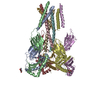 8vspC M: map data used to model this data C: citing same article ( |
|---|---|
| Similar structure data | Similarity search - Function & homology  F&H Search F&H Search |
- Links
Links
- Assembly
Assembly
| Deposited unit | 
|
|---|---|
| 1 |
|
- Components
Components
| #1: Protein | Mass: 32418.971 Da / Num. of mol.: 3 Source method: isolated from a genetically manipulated source Source: (gene. exp.)  Homo sapiens (human) / Gene: HLA-DRA, HLA-DRA1 / Production host: Mammalia (mammals) / References: UniProt: P01903 Homo sapiens (human) / Gene: HLA-DRA, HLA-DRA1 / Production host: Mammalia (mammals) / References: UniProt: P01903#2: Protein | Mass: 33768.199 Da / Num. of mol.: 3 Source method: isolated from a genetically manipulated source Source: (gene. exp.)  Homo sapiens (human) / Gene: HLA-DRB1 / Production host: Mammalia (mammals) / References: UniProt: P01911 Homo sapiens (human) / Gene: HLA-DRB1 / Production host: Mammalia (mammals) / References: UniProt: P01911#3: Protein | Mass: 34901.906 Da / Num. of mol.: 3 Source method: isolated from a genetically manipulated source Source: (gene. exp.)  Homo sapiens (human) / Gene: CD74, DHLAG / Production host: Mammalia (mammals) / References: UniProt: P04233 Homo sapiens (human) / Gene: CD74, DHLAG / Production host: Mammalia (mammals) / References: UniProt: P04233Has protein modification | Y | |
|---|
-Experimental details
-Experiment
| Experiment | Method: ELECTRON MICROSCOPY |
|---|---|
| EM experiment | Aggregation state: PARTICLE / 3D reconstruction method: single particle reconstruction |
- Sample preparation
Sample preparation
| Component | Name: Trimeric complex of invariant chain associated with HLA-DRA1 and HLA-DRB1 Type: COMPLEX / Entity ID: all / Source: RECOMBINANT |
|---|---|
| Molecular weight | Value: 0.33 MDa / Experimental value: YES |
| Source (natural) | Organism:  Homo sapiens (human) Homo sapiens (human) |
| Source (recombinant) | Organism: Mammalia (mammals) |
| Buffer solution | pH: 8 |
| Specimen | Conc.: 5 mg/ml / Embedding applied: NO / Shadowing applied: NO / Staining applied: NO / Vitrification applied: YES |
| Specimen support | Grid material: GOLD / Grid mesh size: 300 divisions/in. / Grid type: Quantifoil R1.2/1.3 |
| Vitrification | Instrument: FEI VITROBOT MARK IV / Cryogen name: ETHANE / Humidity: 100 % / Chamber temperature: 281 K |
- Electron microscopy imaging
Electron microscopy imaging
| Experimental equipment |  Model: Titan Krios / Image courtesy: FEI Company |
|---|---|
| Microscopy | Model: FEI TITAN KRIOS |
| Electron gun | Electron source:  FIELD EMISSION GUN / Accelerating voltage: 300 kV / Illumination mode: FLOOD BEAM FIELD EMISSION GUN / Accelerating voltage: 300 kV / Illumination mode: FLOOD BEAM |
| Electron lens | Mode: BRIGHT FIELD / Nominal defocus max: 2000 nm / Nominal defocus min: 1000 nm |
| Image recording | Electron dose: 60 e/Å2 / Film or detector model: GATAN K3 (6k x 4k) |
- Processing
Processing
| CTF correction | Type: NONE |
|---|---|
| 3D reconstruction | Resolution: 3.03 Å / Resolution method: FSC 0.143 CUT-OFF / Num. of particles: 391922 / Symmetry type: POINT |
| Atomic model building | Protocol: AB INITIO MODEL |
 Movie
Movie Controller
Controller



 PDBj
PDBj